Highlighting the articles in the past editions of the Journal of Screenwriting, of which I am the Book Reviews Editor. Hopefully these abstracts will entice you to did a little deeper into the history and future of screenwriting. — Rosanne
Comedy has always been the least plausibly public service genre. It is entertaining and consequently seen as trivial, closest to commercial and often close to vulgar. Yet comedy remains the key to attracting audiences and is the aspect of programming most greedily eyed by the BBC’s competitors. This article examines how, facing severe competition during the 1970s and 1980s, in the shape of ITV and the arrival of Channel 4 in 1982, the BBC responded to the challenges of this competitive landscape, highlighting the Corporation’s approach to comedy writers and writing as a key competitive tactic. Whilst ITV and Channel 4 had their successes, the BBC, through its emphasis on organic as opposed to formula comedy forms, was able to articulate clearly the differences between its light entertainment and comedy scripts and those of the competitors. For instance, the absence of a commercial break allowed the development of more intricate plots and sub-plots, alongside in-depth characters; the structure of joke-telling adopted a more dramatic form, bringing to light wider themes, and resulting in comedic work that could inform, educate and entertain all at once. Furthermore, the nurturing approach experienced by writers working for the Corporation allowed the encouragement of new writers (to address new niche audiences) and the taking of risks in writing (particularly those under the heading alternative comedy), ultimately enabling writers to produce scripts that allowed the BBC to not only match its competitors, but to exceed them, principally with regard to the idea of what is termed here popular quality programming. As such, the history of the BBC’s approach to comedy writers and the styles and forms of BBC comedy writing can be a means of access to the core debates about what the BBC should do and produce as a public service; here is one strategy that was key to the Corporation’s defence of its public broadcaster status and its funding by licence fee. Its comedy department, scriptwriters and scripts act as an illustration of the shifts and tensions being experienced behind the scenes in the Corporation overall at this particular point in time.
The Journal of Screenwriting is an international double-blind peer-reviewed journal that is published three times a year. The journal highlights current academic and professional thinking about the screenplay and intends to promote, stimulate and bring together current research and contemporary debates around the screenplay whilst encouraging groundbreaking research in an international arena. The journal is discursive, critical, rigorous and engages with issues in a dynamic and developing field, linking academic theory to screenwriting practice.
Get your copy and subscription to the Journal of Screenwriting Today!
* A portion of each sale from Amazon.com directly supports our blogs
** Many of these books may be available from your local library. Check it out!
